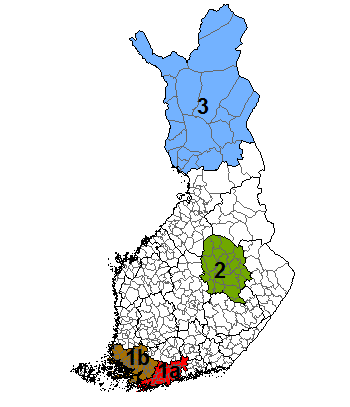
Welcome to the home page of MAVERIC
MAVERIC was a research project that ran from January 2009 to December 2012, with the full title:
"Map-based assessment of vulnerability to climate change employing regional indicators"
The central aim of this project was to map quantitative measures of vulnerability to climate change at municipality scale across Finland. Vulnerability is defined as the degree to which a system is susceptible to, or unable to cope with, adverse effects of climate change. It can be characterised as a function of the exposure, sensitivity and adaptive capacity of a system to climate change.
The project's six specific research objectives were to:
- identify climate variables of importance for selected human activities in Finland and to use observations and model-based future projections of these variables to describe exposure to climate change;
- examine alternative impact models for evaluating sectoral or system sensitivity to climate change, and analyse their suitability for application at municipality scale;
- define appropriate indicators of adaptive capacity to climate change based on the modification of existing sustainability indicators and scenarios, a literature review and discussions with representatives from selected pilot study regions;
- finalise a set of vulnerability indicators for Finland as a whole and develop web-based methods to map these interactively;
- report results at stakeholder workshops to obtain feedback and facilitate refinement and nationwide application of the vulnerability indicators; and
- publish the results in the peer reviewed literature.
The interdisciplinary and multi-institutional project team applied social science methods to investigate the key determinants of adaptive capacity in selected sectors at municipality level, and combined measures of these with climatic and biophysical information on exposure and sensitivity to climate change to derive alternative indicators of present-day and future (mid-21st century) vulnerability to changing climate. The study focused on three topics, concerning climate change vulnerability of agricultural livelihoods, tourism and recreation and the elderly. Methods employed to describe adaptive capacity were largely exploratory, and were tested in contrasting pilot study regions with stakeholder participation (see map).

Finnish municipalities and NUTS-3 administrative regions (maakunnat), including the regions selected for the pilot phase: 1a. Uusimaa, 1b. Southwest Finland, 2. North Savo and 3. Lapland.
Where data were available and the approach appeared to be valid (partly based on the regional pilot studies), some indicators were mapped by municipality at a national scale. An interactive mapping tool is under development, which is an extension of a tool developed in the related CARAVAN project for the Nordic region. This nationwide assessment represents a first attempt to map adaptive capacity and vulnerability across Finland, delivering timely and relevant information for decision makers developing adaptation strategies at the regional scale and offering a basis for identifying regions, sectors and communities that may merit more detailed future analysis.
MAVERIC is closely related to the CARAVAN project "Climate change: a regional assessment of vulnerability and adaptive capacity for the Nordic countries".
Research team and funding
MAVERIC was co-ordinated at the Finnish Environment Institute (SYKE) Project team: Timothy Carter (Project Leader), Stefan Fronzek, Maria Holmberg, Aino Inkinen, Ismo Lahtinen, Hanna Mela, Nina Pirttioja, Noora Veijalainen
The project included five partner organisations in Finland:
- Finnish Meteorological Institute, Helsinki (FMI)
Project members: Heikki Tuomenvirta, Lisa Haga, Reija Ruuhela
- Finnish Forest Research Institute, Helsinki (METLA)
Project members: Tuija Sievänen, Mia Landauer, Marjo Neuvonen
- MTT Agrifood Research Finland, Mikkeli (MTT)
Project members: Reimund Rötter
- Statistics Finland, Helsinki (TK)
Project members: Juha Nurmela
- Aalto University, YTK Land Use Planning and Urban Studies Group
Project members: Sirkku Juhola, Simo Haanpää
The project had two international collaborating partners:
- Department of Sociology and Human Geography, University of Oslo, Norway
Collaborating researchers: Karen O'Brien, Lynn Rosentrater
- Swedish Defence Research Agency, Umeå, Sweden
Collaborating researchers: Louise Simonsson
The project built stakeholder partnerships in MAVERIC's case study regions:
-
Uusimaa and Southwest Finland: Pertti Rauhio, Director of Regional Development, Uusimaa Regional Council, Helsinki; Susanna Kankaanpää, Climate Expert, Helsinki Metropolitan Area Council (YTV), Helsinki; Sari Tollet, Managing Director, The Finnish Ski Area Association, Helsinki; Pekka Ojanen (Director of Regional Development) and Timo Juvonen (Environmental Planner), Regional Council of Southwest Finland, Turku
-
North-Savo: Henrik Rissanen, Director of Regional Development, North-Savo Regional Council, Kuopio; Perttu Virkajärvi, Senior Scientist (animal husbandry and grassland), MTT Maaninka
-
Lapland: Antti Hannukkala, Research Scientist, MTT Plant Production Research, Rovaniemi; Maiju Hyry, Director of Regional Development, Regional Council of Lapland, Rovaniemi; Kaija Kinnunen, Executive Director, MTK Lappi (Central Union of Agricultural Producers and Forest Owners), Rovaniemi; Matti Ylimommo, ProAgria Lappi, Rural Advisory Service, Rovaniemi
Funding for MAVERIC was from the Academy of Finland: 323,000 Euro (Decision number 128043)
Contact information
For more details, contact:
Professor Timothy Carter
Research Programme for Global Change
Finnish Environment Institute (SYKE)
firstname.lastname@ymparisto.fi